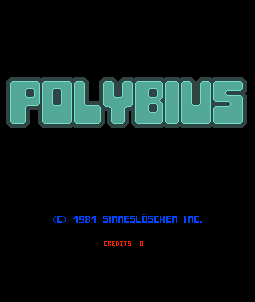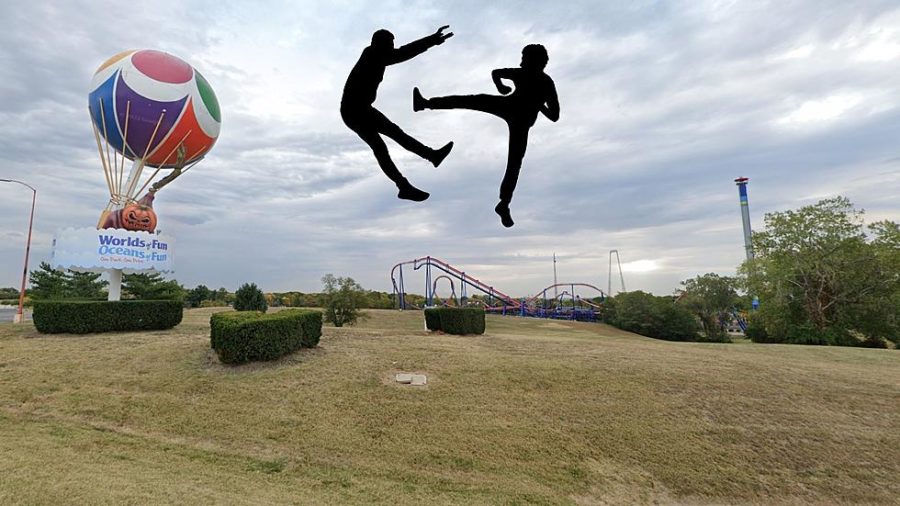Polybius, the Game that Never Existed
Can an arcade game be a form of psychological torture?

One of the only images of Polybius considered real.
November 17, 2022
The name Polybius might mean nothing to most people. To some knowledgeable people, it is the name of a famous historian who transcribed the rise of Rome. To others, it is the name of a famous cipher, used to decode secret messages. However, to enthusiasts of the unknown and unnatural, Polybius is the name of one of the most famous and interesting urban legends of all time.
The story goes that in 1981, a small arcade in Portland, Oregon got a new title to its collection. The case was black and completely undecorated except for the title in bold letters plastered across the top. This game was Polybius. The only credits given were to a German company, Sinneslöschen. The gameplay was said to be a fast-paced shooter with some puzzle elements mixed in. However, the graphics were super abstract and intense, making the game hard to follow for a newcomer.
People started to notice things shortly after the game was introduced. Players of the game seemed to become increasingly and worryingly addicted to the game. There were lines leading out of the building just to get one chance to play. Also, people who played Polybius often started to experience sickness, hallucinations, night terrors, amnesia, and even personality shifts. Clearly, there was something wrong. There were rumors circulating that men in black suits would come and check on the game from time to time. Only a month after Polybius was introduced to the arcade, it was seen being taken out by the men checking on it. Nothing was left behind, and no concrete evidence had been recovered.
It’s no wonder why this story grabbed people’s attention. The strange circumstances and scary side effects would get anybody thinking. That’s not all though, as Polybius may have some secret messages tied to it. The term “poly” means many, and “bios” means life. This can be roughly translated to many lives, or something similar. Also, Sinneslöschen is a mashup of two German words. Sinnes translating to “sense”, and löschen translating as “to erase”. While this speaks for itself, what doesn’t is Sinneslöschen as a company. There are and never have been any records of a company with said name, and even if it was a real company name, Polybius is their only game released. It’s also a strange idea to have a game like this exist back in 1981. Very few arcade games were ever made, due to the difficulty in making them. Past that, even fewer were ever popular, much less this addictive.
So if everything was taken or destroyed, how has this story spread so far? Also, where did that picture come from? Well, to start this story, we need to start looking backward. 2003 seems to be the earliest year Polybius was mentioned in mainstream media, specifically the 180th edition of Gamepro, a respected video game newspaper. In it, there was a section about myths and rumors in gaming, and of course, Polybius showed up there. The magazine gave Polybius an inconclusive answer. It obviously could not be proven real, but it couldn’t be proven fake either. However, the magazine didn’t make any of this up on its own, so let’s look further back. Many people claim the first mentions of Polybius on the internet was on an old chat site called Usenet. Using Google’s archive system, there are mentions of it dating back to February of 2000.
However, the earliest recovered mention of it on Usenet referred to an old website that featured information about old arcade games. This website was coinop.org. If you check the website, there is indeed a page for Polybius, and the date of the page being created is said to be 8/3/1998. This, however, is not the earliest date, because while coinop.org was going through an update a few years ago, all of the older games were changed to match that same date, which also was the date coinop.org was created. Using the Wayback Machine, we can find out the page was created on 2/6/2000, more closely matching the Usenet dates. Unfortunately, this is our brick wall. There is nothing before this mentioned anywhere, websites, magazines, newspapers, or even official documents. It looks like if we are gonna find out where Polybius came from, we need to look at coinop.org.
After the original owner realized he couldn’t take care of the website, coinop.org was given to a man named Kurt Koller. He turned the website from an odd collection of facts to one on the most respected websites for arcade information. Therefore, Kurt had full control over all information going into the website, including the page on Polybius. He was obviously very knowledgeable when it came to arcade games, so it probably would have seemed odd to him if someone gave him information for a game that was on no public records. Not only that, but he most likely would have looked back into it after everyone on Usenet, a site Kurt tended to use, started to believe it was fake. However, the article remains up to this day, with the last edit being made in 2009.
Kurt was also somewhat of an infamous figure himself. In 1993, Kurt made up a story under the username Captain Sarcastic. The story revolves around him trying to pay for his meal using a $2 bill, which the manager thinks is fake. This was a big story for a while due to the absurdity of the idea, but it seems that the story was made up. Does that mean Kurt made the page for Polybius by himself? There is a good chance, as not only would it drive attention to his site, but it would also be a fun story to make up. When asked in an interview about Polybius, Kurt claimed the article was indeed real, and published on 8/3/1998, a date that has been proven false.
Now with all of this information set up, we can now hear the story of Polybius. Keep in mind that most of this information is speculatory, but does paint a good picture of what happened.
On February 6th, 2000, Kurt Koller made a page for a mysterious game called Polybius on coinop.org soon after acquiring the website. Kurt most likely took inspiration from the 1983 movie Nightmare, Battlezone for Atari, and possibly real-world events such as Mk Ultra. The name was most likely a play on the Publius Enigma, a popular myth going around at the time. This was not just to tell a fun tale, but also to draw attention to his site. A few people interested in old arcade games started to talk about this page on Usenet and quickly came to the conclusion that Polybius didn’t exist and the article was wrong or made up. The page sat as a strange part of the website before Kurt told Gamepro about the myth and the information he had about it. This is confirmed by Dan Amrich, the writer of the article. After that, the story took off on its own, appearing in many TV shows and talked about in tons of friend groups across America.
Many people gave false testimonies, either because of fame or genuine misremembering. There was a game at the time that seems to resemble something like Polybius, that being Cubequest. It seemingly had the same gameplay style and odd visuals Polybius is said to have. Not only that, but the game was often removed from the arcades it was in due to it being very prone to breaking. Other than Cubequest, there were also a lot of stories about video game myths floating around the internet not long after Polybius started to pick us steam, so many people grouped it in with the other spooky stories about childhood games. Also, old arcade games tended to have secrets hidden that only professionals would know about, such as Reptile in Mortal Kombat or the Pac-man kill screen.
So that concludes the story of Polybius, the game that never existed. As unfortunate as it is that it isn’t real, the story and subsequent legacy behind it are very interesting to look into. It was really cool to look at the old coinop.org page and the Gamepro article about Polybius, and I highly recommend you check them out too. It feels like looking into a time capsule, knowing that years and years of stories came from the exact place you are looking at now. Despite how disappointing it is to learn that Polybius is most likely fake, it doesn’t stop it from being an amazing story that will stand the test of time as one of the greatest urban legends to ever exist.
Mikkelson, D. (2022, September 1). Did a Taco Bell employee refuse a $2 Bill? Snopes. Retrieved November 15, 2022, from https://www.snopes.com/fact-check/taco-bell-two-dollar/
YouTube. (2017). YouTube. Retrieved November 15, 2022, from https://www.youtube.com/watch?v=_7X6Yeydgyg.
















































































